Popular Reads
Top Results
Can't find what you're looking for?
View all search resultsPopular Reads
Top Results
Can't find what you're looking for?
View all search resultsGovt launches Greater Jakarta LRT to ease traffic, pollution
President Joko “Jokowi” Widodo launched the Greater Jakarta LRT on Monday, heralding the beginning of its service connecting Jakarta and two satellite cities as part of efforts to alleviate chronic traffic in the capital and its worsening air pollution.
Change text size
Gift Premium Articles
to Anyone
President Joko “Jokowi” Widodo launched the Greater Jakarta light rapid transit (LRT) on Monday, heralding the beginning of its service connecting Jakarta and two satellite cities as part of efforts to alleviate chronic traffic in the capital and the worsening air pollution.
The new LRT network spans 42 kilometers and its trains stop at 18 stations along two lines. The Bekasi Line starts at Jatimulya Station in Bekasi, West Java, and the Cibubur Line from Harjamukti Station in Depok, also in West Java. Both lines end at Dukuh Atas Station in Central Jakarta.
“We hope that people will flock in crowds and switch their commute to the LRT [so that] traffic congestion can be avoided and pollution can be reduced,” said Jokowi.
Jakarta has consistently ranked among the top 10 most polluted cities in the world since May, according to data from Swiss air quality technology company IQAir.
The Greater Jakarta LRT’s coming into force will thereby complete the government’s series of mass transportation projects, which includes the Jakarta MRT, the Commuter Line train, TransJakarta buses and the airport-bound trains – all of which have already been in operation for years.
These projects aim to encourage people to start moving away from their personal vehicles, Jokowi said, adding that the number of daily public transportation users had yet to reach the ideal target.
For example, the MRT system, which sees 80,000 passengers hopping on board daily, was still short of the government's goal by 100,000 passengers.
“We’re a regular on the list of top 10 most congested cities in the world. Some 996,000 vehicles enter the city every day, [causing] traffic jams and pollution,” the President said.
Construction of the LRT commenced in 2015 and the line was initially set to start running for the 2018 Asian Games, but the project faced a number of delays resulting from funding and land acquisition constraints.
Now fully operational, the new LRT system can serve up to 500,000 passengers a day. Combined with the Commuter Line train running on similar routes, they could together carry around 1.7 million passengers per day, officials say.
State railway company Kereta Api Indonesia (KAI), which runs the service, earlier said that the Greater Jakarta LRT uses a technology that allows LRT trains to be driverless. But so far, a human operator will be on board in case the train encounters any problems, according to the Transportation Ministry's director general for railways, Risal Wasal.
Some cabinet members attended the launching of the LRT on Monday, including Coordinating Maritime Affairs and Investment Minister Luhut Pandjaitan, Finance Minister Sri Mulyani, State-Owned Enterprises (SOE) Minister Erick Thohir and Transportation Minister Budi Karya Sumadi.
Speaking to reporters at the event, Budi said the new LRT would not only provide ease for travelers, but would also be advantageous to the environment and impart a “new culture” of time management and punctuality for Indonesians.
“An important aspect of [this LRT] is that it will spark a new culture where we respect the time. We’d also learn how to maintain cleanliness and to refrain from eating when commuting. God willing these norms will be mainstreamed,” he said.
In one of the most congested and polluted cities in the world, the average person in Jakarta spends 106 hours sitting in traffic yearly, according to 2022 data from the TomTom Traffic Index. Out of the 918 kilograms of carbon dioxide produced annually by a single vehicle, 230 will have been due to congestion, the same index found.
The government has been considering extending the LRT network farther south and east from Jakarta to include Bogor city and Karawang regency, both located in West Java. Currently, the lines reach Depok to the south and Bekasi to the east.










